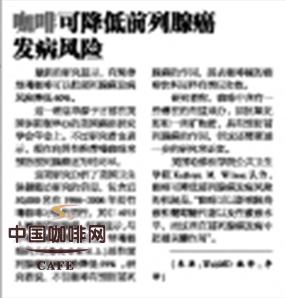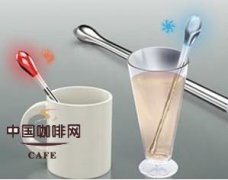Research shows that coffee can reduce the risk of prostate cancer
Researchers from Harvard conducted the analysis based on a long-term follow-up study funded by NIH. The study looked at 50000 men and recorded, among other things, their long-term coffee intake over a 20-year period ending in 2006. The amount of coffee each person drank every four years was associated with prostate cancer risk.

Men who drank more than six cups of coffee a day were 60 percent less likely to develop any terminal cancer than those who never drank coffee at all. Those who consumed four to five cups of coffee a day had a 25 percent lower risk of prostate cancer, and those who consumed three cups had a 20 percent lower risk.
Overall, coffee drinking seems to be associated with a lower risk of prostate cancer to some extent, but the magnitude of this effect is not statistically significant. Of course, this form of epidemiological study does not definitively prove a causal link between coffee drinking and reduced prostate cancer, but men who drink too much coffee may have a preventive effect, making them less likely to develop prostate cancer.
But lead author Catherine Wilson, a Harvard postdoctoral fellow, said there was reason to believe there might be a causal link. There is already evidence that "coffee affects insulin and glucose metabolism, as well as sex hormone levels, all of which play a role in prostate cancer," she said in a statement. "The association between coffee drinking and prostate cancer is plausible."
This study is the first to find a link between coffee drinking and prostate cancer, which is inconsistent with previous studies that have not found such an association. This work is preliminary, but more needs to be done to see if coffee drinking is a convenient and effective way to prevent prostate cancer. "People shouldn't start changing their coffee drinking habits and coffee consumption until further truth is discovered," Wilson said. The findings were presented at a recent meeting of the American Association for Cancer Research in Houston.
Important Notice :
前街咖啡 FrontStreet Coffee has moved to new addredd:
FrontStreet Coffee Address: 315,Donghua East Road,GuangZhou
Tel:020 38364473
- Prev

Magic Coffee mixing Bar is a revolutionary way to make coffee.
Here is a revolutionary way to make coffee directly with a coffee mixer. This cappuccino coffee stirring bar is made up of a spoon and coffee wrapped on a spoon. When it comes into hot water, the coffee melts slowly and its fragrance overflows. Tear open the outer package and you can see the spoon wrapped in the coffee. With gently stirring, the coffee stirring stick will fully dissolve.
- Next

Five cups of coffee or tea a day can reduce the risk of cancer
Drinking at least five cups of coffee or tea a day can help prevent brain tumors, according to a new study by Imperial College London. The findings are published in the journal Cancer Epidemiology, Biomarkers and Prevention. In the course of the experiment, the researchers examined more than 300 men and women who were diagnosed with gliomas, a tumor that usually starts in the brain.
Related
- Detailed explanation of Jadeite planting Land in Panamanian Jadeite Manor introduction to the grading system of Jadeite competitive bidding, Red bid, Green bid and Rose Summer
- Story of Coffee planting in Brenka region of Costa Rica Stonehenge Manor anaerobic heavy honey treatment of flavor mouth
- What's on the barrel of Blue Mountain Coffee beans?
- Can American coffee also pull flowers? How to use hot American style to pull out a good-looking pattern?
- Can you make a cold extract with coffee beans? What is the right proportion for cold-extracted coffee formula?
- Indonesian PWN Gold Mandrine Coffee Origin Features Flavor How to Chong? Mandolin coffee is American.
- A brief introduction to the flavor characteristics of Brazilian yellow bourbon coffee beans
- What is the effect of different water quality on the flavor of cold-extracted coffee? What kind of water is best for brewing coffee?
- Why do you think of Rose Summer whenever you mention Panamanian coffee?
- Introduction to the characteristics of authentic blue mountain coffee bean producing areas? What is the CIB Coffee Authority in Jamaica?

